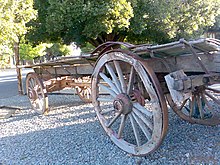If it ain't broke, don't fix it.
"During the summer of 1780 this wretched 'Continental' currency fell into contempt. As Washington said, it took a wagon-load of money to buy a wagon-load of provisions. At the end of the year 1778, the paper dollar was worth sixteen cents in the northern states and twelve cents in the south. Early in 1780 its value had fallen to two cents, and before the end of the year it took ten paper dollars to make a cent. In October, Indian corn sold wholesale in Boston for $150 a bushel, butter was 812 a pound, tea
190, sugar $ 10, beef $8, coffee $12, and a barrel of flour cost $1,575. Samuel Adams paid $2,000 for a hat and suit of clothes. The money soon ceased to circulate, debts could not be collected, and there was a general prostration of credit. To say that a thing was 'worth a Continental * became the strongestpossible expression of contempt."—J. Fiske, The Am. Revolution, eft. 13 {v. 2).—Before the close of the year 1780, the Continental Currency had ceased to circulate. Attempts were subsequently made to have it funded or redeemed, but without success. See United States Ok Am.: A. D. 1780 (january— April).
History for ready reference, from ... - Alan Campbell Reiley - Google Books
In 1785 the United States pegged its currency to silver, an act reinforced in 1792.....This too proved irksome, as the ratio tended to make silver more valuable internally than it was internationally; hence foreign traders and international currency speculators demended gold for silver, leading to a drain on gold reserves.
Class in America: A-G - Robert E. Weir - Google Books
Where this has been the policy (in Connecticut for instance) the prices of every article have fallen and the money consequently is in demand; but in the other States you can scarce get a single thing for it, and yet it is with-held from the public by speculators, while every thing that can be useful to the public is engrossed by this tribe of black gentry, who work more effectually against us than the enemys Arms; and are a hundd. times more dangerous to our liberties and the great cause we are engaged in.
Washington to Edmund Pendleton, November 1, 1779 - For Teachers (Library of Congress)
Al
"During the summer of 1780 this wretched 'Continental' currency fell into contempt. As Washington said, it took a wagon-load of money to buy a wagon-load of provisions. At the end of the year 1778, the paper dollar was worth sixteen cents in the northern states and twelve cents in the south. Early in 1780 its value had fallen to two cents, and before the end of the year it took ten paper dollars to make a cent. In October, Indian corn sold wholesale in Boston for $150 a bushel, butter was 812 a pound, tea
190, sugar $ 10, beef $8, coffee $12, and a barrel of flour cost $1,575. Samuel Adams paid $2,000 for a hat and suit of clothes. The money soon ceased to circulate, debts could not be collected, and there was a general prostration of credit. To say that a thing was 'worth a Continental * became the strongestpossible expression of contempt."—J. Fiske, The Am. Revolution, eft. 13 {v. 2).—Before the close of the year 1780, the Continental Currency had ceased to circulate. Attempts were subsequently made to have it funded or redeemed, but without success. See United States Ok Am.: A. D. 1780 (january— April).
History for ready reference, from ... - Alan Campbell Reiley - Google Books
In 1785 the United States pegged its currency to silver, an act reinforced in 1792.....This too proved irksome, as the ratio tended to make silver more valuable internally than it was internationally; hence foreign traders and international currency speculators demended gold for silver, leading to a drain on gold reserves.
Class in America: A-G - Robert E. Weir - Google Books
Where this has been the policy (in Connecticut for instance) the prices of every article have fallen and the money consequently is in demand; but in the other States you can scarce get a single thing for it, and yet it is with-held from the public by speculators, while every thing that can be useful to the public is engrossed by this tribe of black gentry, who work more effectually against us than the enemys Arms; and are a hundd. times more dangerous to our liberties and the great cause we are engaged in.
Washington to Edmund Pendleton, November 1, 1779 - For Teachers (Library of Congress)
Al

Comment